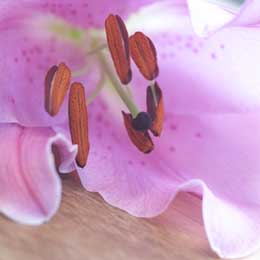
info about the flowers & plants association |
| the latest events in the flower world |
view the latest flower fashion trends |
green & gorgeous – boost your wellbeing with houseplants |
advice on where to buy & recommended retailers |
data & details about the flower industry |
how
to join and what benefits we can offer you as a member |
for
journalists & the media – what we can do for you |
index
of pages on this site to aid your navigation |
|
Lily
Name: Lilium candidum
was the most significant flower symbol for Christians and suggested purity. As
a symbol of purity associated with virgins it became known as the Madonna Lily. Origin: One of the first descriptions of the lily dates from the Chinese Middle Ages "the plant flowers until late autumn and there are three types, red, yellow and purple". Colour: Some forms (Lilium longiflorum, L. candidum, oriental lilies) are highly perfumed but white only; others (asiatic lilies) are highly coloured but scent-free Availability: All year. Care Tips: Remove the pollen stamens by pinching them together and pulling them up out of the flower. This prolongs the flower's life as well. Use sellotape to remove pollen, not water which will fix the stain. Trivia: Facts: Lilies have been cultivated for over 3000 years. Feng Shui believers hold the lily as an emblem of summer and abundance; to the Chinese, lily means "Forever in love". The lily was the holy flower of the ancient Assyrians. Until the 16th century the Madonna lily was the only garden variety known, because of this the "lilies of the field" as mentioned in the bible are thought to be this specific lily. A lily has adorned the coat of arms of the kings of France since 1179. King Chlodwig I allegedly received this 'fleur de lys', as it is called in heraldic language, from an angel. But in actual fact his flower wasn't a lily, as the name implies, but an iris. Via Louis XI the motif made its way to the coat of arms of the Medici family, and from there on to the arms of Florence and Tuscany. Interestingly, only the Florentine 'fleur de lys' has stamens like a lily. Mythology: In Greek poetry, the lily stood for tenderness. It was also referred to as the voice of cicadas or of the muses. There is a Greek myth that tells us how the lily was born from the milk of the goddess Hera. The lily still symbolises pure, virginal love in the Christian world. Medicinal: In the past, various flowers were used to prepare remedies in popular medicine. In China some served as lucky charms, while others were thought to be capable of averting the evil eye. In another historical account we read that people were interested in lilies for their anti-toxic powers and their capacity of curing depressions. In Europe, too, lilies were used as a remedy against a wide range of diseases and ailments right up to the beginning of the last century Caution: Be aware that lilies can be highly poisonous to cats. Owners should be aware of this risk and keep their pets away from them.
| |
 |